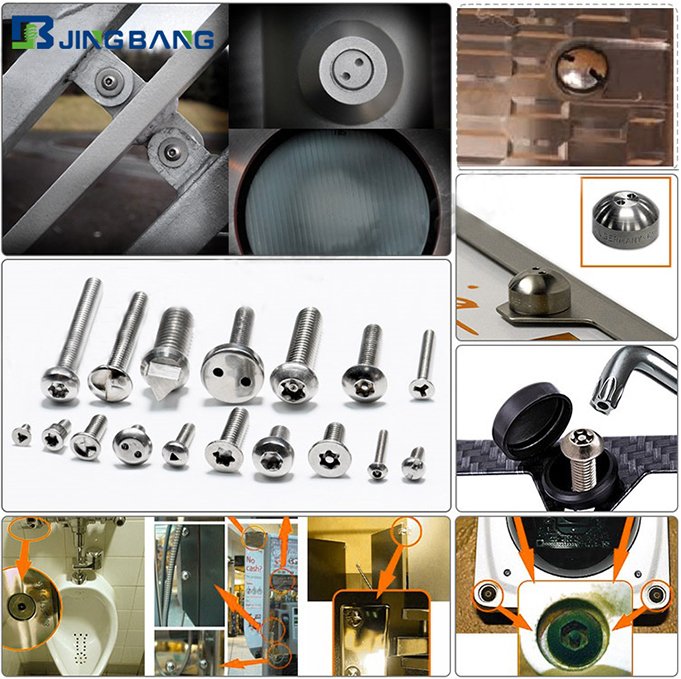
Security Nut Bolt Fastener is a common part used for fastening and connecting in our life. From small screws on watches to large mechanical parts or aircraft bolts and nuts, fasteners play an important role.
Through the summary, when using Security Nut Bolt Fasteners, common misunderstandings mainly have the following kinds, I hope to help you.
Misunderstanding one: use thick thread bolts instead of fine thread bolts.
The bolts with many important connections on the machine are mostly fine-tooth threads, such as drive shafts. If parts are missing during maintenance, some maintenance personnel will use coarse teeth bolts instead, which should be avoided.
This is because the inner diameter of the fine-tooth bolt is larger, the pitch and the outer Angle are smaller, the strength is high, the self-locking performance is good, and the ability to bear impact, vibration and exchange load is also relatively strong. Once the coarse tooth bolt is used instead, it is easy to loose or remove, break, and even cause mechanical accidents.
Misunderstanding two: pores do not match.
Bolts on the machine that bear lateral loads and shear forces, such as drive shaft bolts and flywheel bolts, whose fit with the bolt hole is a transition fit, the assembly should be strong and reliable, and can withstand lateral forces. Some people do not pay attention to inspection in the assembly process, and continue to install when there is a large gap between the bolt and the bolt hole, which is easy to happen bolt loosening or cutting accident.
Misunderstanding three: thickening nuts to increase the reliability of the connection.
Some people mistakenly believe that thickening nuts can increase the number of turns of thread and improve the reliability of the joint. However, in fact, the thicker the nut, the more uneven the load distribution between the turns of the thread, the more likely the joint loosening.
Misunderstanding four: a nut with multiple washers.
After the installation, the bolts sometimes become too long, so someone installs extra spring washers on the bolts. In this case, the uneven force of the spring washer during the stiffening process will break, thus reducing the preload of the bolt, and may produce eccentric loads, reducing the reliability of the bolt connection.
Misunderstanding five: the tighter the better.
Many workers have such a misunderstanding: that is, they believe that the bolt should be “rather tight than loose”, so they deliberately increase the tightening torque, resulting in bolt slip buckle. In addition, some of the important bolts that need to be tightened with torsion force, but some people use adjustable wrench to screw because of the convenience, resulting in insufficient torque, resulting in bolt loosening, and even mechanical failure.
Misunderstanding six: the washer is too large.
Sometimes the appropriate size of the washer is missing, some workers will use a larger diameter washer instead. In this case, the lower part of the bolt head and the washer contact area becomes smaller, will reduce the washer bearing pressure or locking force. If there is vibration and impact in the working environment, the bolt is easy to loosen.
Misunderstanding seven: lock is not appropriate.
Important bolts should be locked by anti-loose devices after assembly. Here are four cases to explain. If using cotter pin lock, do not use too fine opening lock or half piece opening lock to lock; If the spring washer is used to lock, the opening of the washer shall not be too small; If the lock piece is used, the lock piece shall not be locked at the edges and corners of the nut; If a double nut lock is used, thinner nuts should not be mounted on the outside.
Misunderstanding eight: false firm.
If there is rust on the bolts, nuts or threads, or impurities such as scale and iron filings, make sure to clean them before assembly. The joint surface of the joint part has burr, sediment and other impurities should also be removed. Otherwise, when tightening the bolt, it appears to be tightened, but in fact the joint is not really pressed. Under such false firmness, the bolts will come loose quickly in the event of vibration, load shock, and temperature change.
JINGBANG is a one-stop solution company for fasteners and fixing. As a reliable fastener supplier, we can provide a wide range of t-nuts, screws, washers, sleeves, bolts, rivets, and so on. If you want to know more about fasteners or have any fastener purchase requirements, do not hesitate to contact us, and then our experienced salesmen will respond you as soon as possible.
